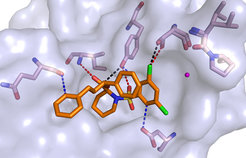Small molecules are supposed to correct pathological stress response
Max Planck scientists design chemical compounds for future drugs for treatment of anxiety disorders and depression
Stress can make people ill, especially, if the organism`s molecular machinery is not capable to cope with it. Numerous studies in patients have identified the protein molecule FKBP51 (FK506 binding protein) as a sensitive regulator of the stress response. FKBP51 determines the signal transmission efficiency of the stress hormone cortisol in the organism and thus provides an ideal approach for therapeutic intervention in diseases.
Scientists around Florian Holsboer, Director of the Max Planck Institute of Psychiatry, have for the first time succeeded in developing small chemical substances affecting the molecular function of FKBP51. In doing so, they paved the way for designing new pharmacological targets for the whole substance class of the FKB proteins in order to develop future drugs, not only in the field of stress regulation.

Although treatment of anxiety disorders and depression with antidepressants is usually successful, it is, nevertheless, not satisfactory as it is partly only after months that any therapeutic effects can be noticed. The observation that patients with certain polymorphisms in the FKBP51-coding gene recuperate more quickly after treatment with antidepressants makes this protein a particularly attractive possible medical target. Felix Hausch, Research Group Leader at the Max Planck Institute of Psychiatry, investigates how the biological function of FKBP51 can be influenced by interaction with smaller substances in order to normalize the control of the organism`s actual stress response.
Due to its capacity to inhibit the glucocorticoid receptor, FKBP51 plays a pivotal role in the stress reaction. Accordingly, this receptor reacts less insensitive to the stress hormone cortisol which, in turn, causes a weaker adaptation to stress. Important for this interaction with the glucocorticoid receptor is an enzymatically active pocket of FKPB51 (Figure). This reactive area of FKBP51 can be blocked by binding of the natural substance FK506. For the very first time, Felix Hausch and his colleagues have developed on the structural basis of FK506 low molecular chemical compounds which alter the activity of FKBP51.
„We are optimistic that the FKBP ligands we designed will influence the biological function of FKBP51“, says Felix Hausch. „Now, studies involving animal experiments will have to show whether those ligands are also effective in correcting an elevated stress reaction in the organism. In this case, we would have developed the basic chemical component for future drugs which would help the patients much more directly and, hopefully, also more rapidly than current antidepressants.“
BM
